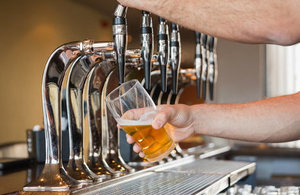Call for evidence launches on airport licensing laws
The government has asked for the publics' views on introducing alcohol licensing laws in airports, to reduce problems with drunk and disruptive passengers.

The government is asking the public for evidence and views on whether introducing alcohol licensing laws at airports in England and Wales could help tackle the problem of drunk and disruptive passengers.
Currently, sales of alcohol by pubs, bars, restaurants, lounges and shops located beyond the security gates at international airports in England and Wales are not regulated by licensing laws. This means that rules intended to stop sales to drunk individuals or prevent irresponsible promotions do not apply to them.
Minister for Crime, Safeguarding and Vulnerability Victoria Atkins said:
Air travel often marks the start of an exciting holiday abroad and airports are places to eat, drink and shop as we wait to board our flights.
Most UK air passengers behave responsibly when flying, but any disruptive or drunk behaviour is entirely unacceptable.
This government is committed to ensuring that the travelling environment for airline passengers remains safe and enjoyable.
This is an excellent opportunity for all interested parties to engage directly with us, inform our understanding of the problem and identify suitable solutions.
The call for evidence comes after the House of Lords Select Committee recommended that following a rise in reports of drunk and disorderly airline passengers, airside outlets that sell and supply alcohol to air travellers should comply with the same licensing rules as elsewhere.
Feedback from interested parties will help the government establish the scale of the problem and assess the advantages and disadvantages of applying the Licensing Act 2003 to airside premises.
The 3 month call for evidence is open to all who wish to contribute.
A survey by Unite of over 4,000 cabin crew working for British-based airlines in August 2017 found that 87% of respondents reported witnessing drunken passenger behaviour at UK airports or on flights from UK airports.
While the Licensing Act 2003 does not regulate the sale and supply of alcohol on planes, travellers already face up to 2 years in prison or an unlimited fine for drunkenness on an aircraft. The government is also taking a wider look at how the issue of disruptive passenger behaviour could be managed through the development of the new UK Aviation Strategy.